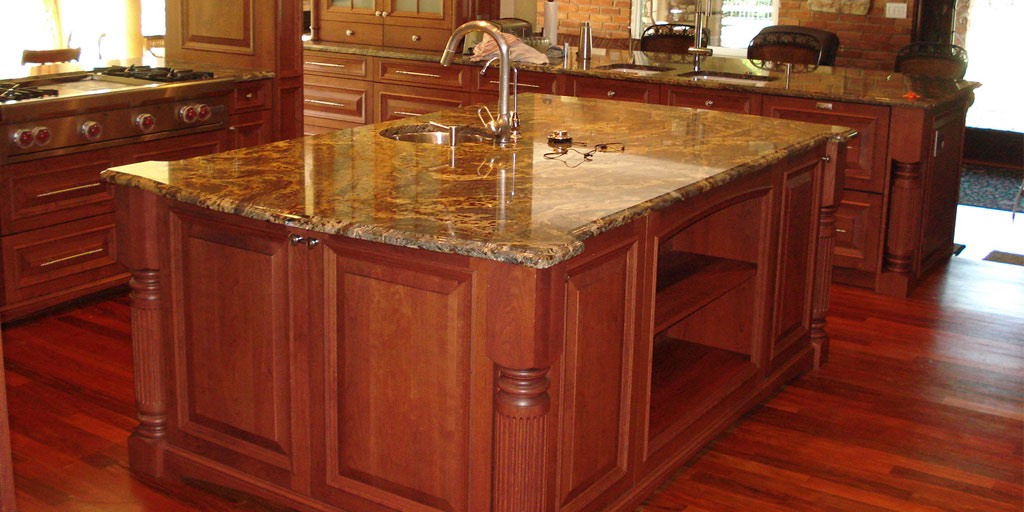One step to increasing the life of the natural stone surfaces in your home is knowing how to properly maintain them. Each type of natural stone has different properties that must be considered before planning your cleaning procedures. Excluding concrete, which has its own set of unique properties, some of the most common countertop surfaces we see are marble and granite. Although they may appear similar, marble and granite require very specific care. Since GK’s Custom Polishing, Inc. is Cleveland’s premier natural stone maintenance company, we want to help educate our customers on how they can maintain their natural stone surfaces the best ways possible. Here are some tips to help you properly clean and protect your natural stone countertops.
Granite and Marble Countertops
The best type of daily cleaner to use on any natural stone countertop is a neutral cleaner (pH 7). There are several different manufacturers on the market that make natural stone cleaners and most of them are neutral. Some cleaners have a polish or sealer built into the cleaner which can provide added shine and protection. Always be sure to use granite specific cleaners and to avoid anything acidic or corrosive such as ammonia, bleach, vinegar or lemon. Highly acidic chemicals will eventually start to eat away at the natural stone.
To check if your natural stone countertops need resealed, take a few drops of water and place them on top of your granite countertop. If after a few minutes, the water is absorbed by the natural stone, then your countertop could use an application of an impregnating sealer. The impregnating sealer prevents any type of liquid (water or oil) from immediately penetrating into the natural stone. To avoid stains, clean spills immediately. Avoid abrasive sponges or fabrics. Stick to microfiber or terrycloth towels for cleaning and drying. Microfiber will help to avoid streaking on granite when drying.
Granite is a very hard natural stone and rarely requires refinishing. When granite does need refinished (usually 15-25 years after initial install for a normal traffic kitchen), this is completed by using diamond abrasives and polishing materials. Please hire a professional for this type of service.
Unlike granite, which seldom needs refinishing, marble is a much softer type of stone that scratches much easier. In addition, marble is a calcium-based stone that reacts very negatively (almost instantly in some cases) when it comes in contact with something acidic. When the acid comes in contact with the marble, it creates a chemical reaction that burns a dull spot into the marble. These dull spots are commonly referred to as etch marks. Dull spots and etch marks can be removed by honing the marble, which is performed by using diamond abrasives with hand machines. The marble is polished with hand machines and powders after the scratches and etch marks are removed. Please hire a professional for this type of service.
A few more simple tips for keeping your countertops looking new:
- Never place anything hot on the natural stone countertop (pans, irons, etc…). If this doesn’t do damage instantly, it will do damage if you put something hot in the same place many times. Granite is very hard, but it is nowhere near indestructible. We have seen granite cracked all the way through an entire island because of something hot placed on the surface.
- Always cut on a cutting board. On a scale from 1-10 (Moh’s Hardness Scale), granite is usually an 8-9 and steel is a 7. Most of the time granite is harder than steel, but it can still scratch granite relatively easily.
- Try not to drop anything heavy on your natural stone. This can create crystalline fractures in the natural stone that are usually not fixable.
- Use coasters when beverages are placed on marble or granite surfaces. We have seen just water create dull etch marks in marble. It is better to be safe than sorry.
- In bathrooms, please be careful with perfume, hairspray, contact solution, toothpaste, mouthwash and any other slightly acidic chemicals. These can all create etch marks on marble.
- In kitchens, be careful with all food ingredients and beverages. Citrus fruit, soda, liquor, tomatoes and lots of other food ingredients have an acidic quality. These can all etch marble and most can etch marble instantly.
- If you have any hard water deposits (white calcium buildup) around the faucets, try using a high alkaline cleaner to remove this buildup. You can use a #0000 steel wool on granite to help remove calcium buildup (but it cannot be used on marble). Just make sure the steel wool is #0000 and not a more aggressive type.
We have been serving our customers since 1994 so we know a thing or two about stone. We sell a large selection of DuPont StoneTech cleaners, sealers and polishes for natural stone, grout and more. Head over to our website to place an order. Do you have a question about your natural stone surfaces or do you need some work done? Give us a call at (440) 937-4457 and talk with our staff. We offer free estimates for all hard surface work so don’t hesitate to call.







